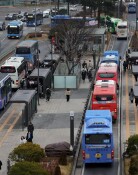[Op-Ed] Nationality
Judoka Chu Sung-hoon, an ethnic Korean from Japan, returned to Korea in 1998 to realize his dream of joining the Korean national team and competing in the Summer Olympics. His dream failed, however, as he gave up his Korean citizenship and returned to Japan after gaining a Japanese passport. He participated in the 2002 Busan Asiad as a member of the Japanese team, and won a gold medal. Baek Cha-seung, an ethnic Korean playing in the U.S. Major League Baseball, made the preliminary list of candidates for the Korean team at the second World Baseball Classic in March. He, however, was cut because of criticism for giving up his Korean citizenship to dodge military conscription as a Korean man. Athletes are not the only ones to suffer due to nationality issues.
In the U.S., a naturalized foreigner who acquires American citizenship or a U.S. citizen who gains foreign citizenship can retain U.S. nationality unless he or she renounces U.S. citizenship after age 18. Washington does not force a citizen with dual citizenship due to birthplace to choose nationality. Likewise, more than 80 countries recognize multiple citizenships, including Canada, Argentina, France, Italy, Sweden and Britain. They do so because they judge that the measure serves their national interests in attracting as much skilled personnel as possible in this era of global competition.
The Korean government has announced a revision bill to the Nationality Act. The bill urges allowing dual citizenship for a U.S. or Canada-born man with two or more citizenships who finish his compulsory military duty. A foreigner married to a Korean spouse and immigrates to Korea can also hold dual citizenship. The new law will also allow qualified foreign human resources, Korean adoptees from overseas, and senior citizens aged 65 or older who have lived overseas for a long time to keep their Korean citizenship without giving up their foreign passports. Many Koreans have had the chance to live abroad, so at least 50,000 of them are born in foreign countries and acquire dual citizenship. Moreover, those who are married to Koreans numbered 126,155 as of late June. In light of this reality, the government plans to expand the scope to better reflect the situation.
The conventional citizenship system deprives a Korean with multiple nationalities of Korean citizenship. This has been criticized as a regressive system that effectively drives quality human resources overseas. The government has now changed the term double nationality into multiple nationalities. Nevertheless, critics warn of side effects, including a hike in the number of pregnant women going abroad to get their newborns foreign citizenship or those who want to exploit foreign nationality in violation of their pledges. Seoul must filter out those who exploit this good cause, but cannot afford to miss out on this opportunity just because of potential side effects.
Editorial Writer Park Seong-won (swpark@donga.com)







